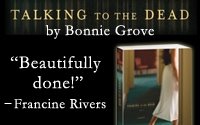
When it comes to writing fiction, there are 6 billion things to know and learn. I've counted. Stayed up all night once just counting and counting.
Inevitably, the question arises: What is the most important thing? What matters most when it comes to fiction. It's a good question, one I've been thinking about for awhile now. And I'm going to share my answer with you.
Yes, I have an answer.
Really. I do.
Stop smiling, I'm serious.
In order to tell you my answer I first need to tell you a story.
Once upon a time I was sitting at a kitchen table reading part of a manuscript. Across from me was the author of said manuscript. She watched me read, picking her nails, crossing and uncrossing her legs, trying to be quiet while I read.
All the time I was reading I was thinking this writer wanted my opinion on the quality of her writing and what I thought of her work in general. I was wrong. She wanted something very different. Very impossible. But I didn't know that at the time, so I put the manuscript down and started talking to her like a writer. She nodded, yes, yes, all well and fine, good, good, I agree with you.
I pushed the pages across the table. She pulled her hands back fast, like the papers might be poisoned. She wouldn't touch them. "Should I keep writing?" she asked me. "Am I good enough? Or should I just forget it?"
I pulled the pages back and glanced through them again. I understood what she was asking. Her writing was good. Technically, nearly perfect. Her transitions were smooth, her characters well defined. She had nice, clean descriptive and her grammar was enviable. Nicely done.
But.
Hmmm. What was missing? Something.....oh......something like - a plot? No, no, that wasn't missing. She had a plot all plotted out with plot points and pointed plotting. That wasn't the issue. Some else, less tangible, but important. More important than anything else.
The story. Something about the story itself. No, no, it was a good story.
Hmmm. What then? Why was I so willing to put the manuscript down and not pick it back up? Let's go over that again:
Writing skill ............... Check!
Clean manuscript ......... Check!
Good plot ................... Check!
Yet, the thing just laid there, like a dead mackerel, staring up at me with its one good eye.
Then it hit me! (the answer, not the dead mackerel)
She was a skilled writer, not a skilled story teller.
I grinned at her. "You are the only one who can decide if you should keep writing. My advice is to stop writing and start telling stories."
Have you ever picked up a latest bestseller and thought, "Jeepers, this isn't the best writing I've ever seen?" If you have, you're probably a writer - because no one else is worried about the writing. Readers want a great story told in an interesting way. They want to be engaged, have fun, get lost, fall in love, feel something new, and forget time and place.
But doesn't great writing help all of that to happen? Yes, of course it does. But good writing means seamless writing - writing that is so good the reader can forget about it and just have a ball in the story.
What's the most important aspect of writing? Storytelling. How you tell the story matters more, carries reader further, and, in the end, sells more books than technically great writing ever could.
Want to test my theory? Here's what to do:
Find a familiar story to tell. Could be Goldilocks and the Three Bears, could be an old fashioned ghost story, could be a famous work - something you like. Get a friend or two or three gathered around. Then tell the story. I mean tell it, all hands on deck, no holds barred, tell the story. Make mental (and later concrete) notes on the people's reactions. Did you hold their attention the entire time? Did you hook them with your opener? Did they laugh when you thought they would? Did they smile at an unexpected time? Did they cry?
Later (say, in a week or so) as your friends what they remember about the time you told them that story.
No one is going to say, "I remember that you used just the right words at just the right time and your characterization was spot on, oh, and when you got to a tricky part in the plot you made it so easy to follow!" Nope, they won't say that. They'll say, "Oh, that was so fun! I love the way you told that story."
Writing is only the means. The story is what matters.
I bid you good writing - and storytelling.










